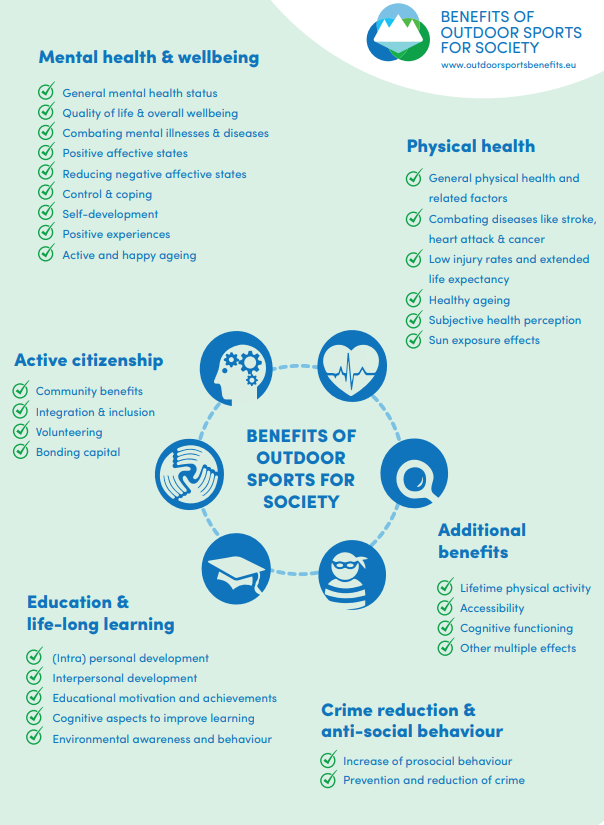Benefits of Outdoor Sports on Society
We know that outdoor sports have all sorts of benefits for both the participants and for the local economy.
At an EU level there is no agreed mechanism for comparing the social benefits of sport including outdoor sport in economic terms. If better understood it could provide new opportunities for investment in delivering preventative Health Enhancing Physical Activity (HEPA) in nature rather than adopting what is perceived to be a more costly curative approach.
The project adopted a multi-disciplinary approach involving world leading academic institutions, central and local government agencies, federations and practical deliverers to ensure its credibility in development and practicability in delivery.
What does the BOSS involve?
BOSS involves a 3 stage sequential and logical approach:
Stage 1 involved a systematic review of existing studies and projects that have examined the social benefits that have been evidenced from outdoor sports across Europe.
Stage 2 involved using the information gathered from the Stage 1 review and then developed an agreed methodology for capturing the value of social benefits.
Stage 3 involved the testing and evaluation of the methodology in practical projects and programmes across the partner states, to ensure that it was practicable to do and that it produced comparable information. This involved training case study programme leaders in the methodology developed.
Throughout these stages there was a programme of dissemination of notes from meetings, the findings of the research, the development of the methodology and information from the test projects. This was done through a dedicated website (www.outdoorsportsbenefits.eu) and associated social media as well as through direct mailings, reports, conferences, articles, a published academic paper[1] and also a published chapter in a book[2].
BOSS has been facilitated by the European Network of Outdoor Sports (www.outdoor-sports-network.eu).
The process for the literature review
The literature review was carried out with seven partners from Bulgaria, France, Germany, Italy, Portugal Spain and the United Kingdom using data bases of academic research and practical information. It used a “search string” of key words to search the title and abstract of research papers. This element of the project was led by Technical University of Munich (TUM) who also searched for other international studies
A timeframe of 15 years from March 2002 to March 2017 was set for the search. A total number of 20,950 hits were identified through the primary search and after deletion of duplicates this was reduced to 17,560 studies. These were then screened for inclusion by title and abstract.
From this vast number of studies a total of 133 studies were selected and standardised forms were developed to extract relevant data from them. The detail on these 133 studies can be downloaded from the BOSS website www.outdoorsportsbenefits.eu/resources.
Findings
The benefits were grouped into six broad categories of:
- Physical health
- Mental health and wellbeing
- Education and life-long learning
- Active citizenship
- Crime-reduction and anti-social behaviour
- Additional benefits
The key findings from this literature review were that that outdoor sports:
- Effectively combine the positive outcomes of physical activity and being in nature.
- Provide significant improvements in mental health and well-being and there are a wide range of physical health benefits for individuals.
- Are also effective for intra and interpersonal development and contribute to other social benefits such as active citizenship and crime reduction.
- Can be effectively used to connect people with nature and can create improved environmental education and awareness.
- Provide a broad range of sport and recreational activities and opportunities that both engage and provide benefits to people of all ages, social or economic background and ability.
- Can be used to encourage regular and sustained participation.
- Have few limitations to participation and are ideal for providing life-long physical activity.
